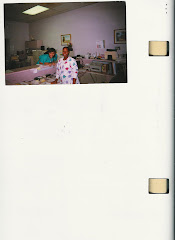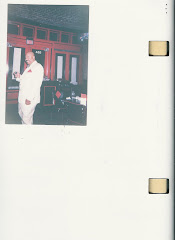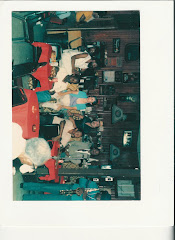Tuesday, February 3, 2009
Etanol and cáncer
Esto será un aviso oficioso referente a cualquier persona que personalmente o que tenga un pariente que esté muriendo de cáncer. Hay apenas una ...... Factor-Alfa implicada culpable de la necrosis del tumor. Como en el caso de la muerte en síndrome tóxico del choque el extremo es choque o derrumbamiento cardiovascular. Esto ocurre como consecuencia de volumen disminuido, de la presión oncótica (albúmina) o de la falta de bomba. Cuanto mayor es la cronicidad, cuanto mayor es la pérdida de albúmina, e integridad cardiovascular debido a mitocondrial disminuida al funcionamiento intercelular. El cuerpo en su asimilación preferencial de los aminoácidos esenciales para sintetizar TNF digiere literalmente otras fuentes de la proteína del no-tumor dentro del cuerpo. ¿El tumor digiere literalmente a otras partes del cuerpo en una supervivencia “inteligente” del más apto mientras que da vuelta casi por instinto apagado a la inhibición de regeneración de la producción de TNF.How él hace esto? De estudios en la producción excesiva de mesangium dentro del riñón hemos aprendido que HuR bloquea la deterioración normal del mMRNA responsable de hacer las varias proteínas. (El etanol promueve el accesorio de HuR al mRNA de TNF. Con todo NINGUÌN disminuye el mRNA.) la disminución normal de TNF por IL6 por ejemplo, es prevenido aumentando su producción en el nivel del posttranscriptional. Sin embargo hay un receptor obligatorio necesario para la acción de TNF. Sin ella no hay acción de TNF en el nivel del genoma. El bloqueo del receptor permite la obstrucción de la acción. El anticuerpo monoclonal al receptor de TNF está disponible ahora.
Monday, February 2, 2009
Ex-officio announcemnet: No need for death from cancer
This will be an unofficial announcement pertaining to anyone who personally or who has a relative who is dying from cancer. There is just one culprit involved……Tumor Necrosis Factor-Alpha.
As in the case of the death in toxic shock syndrome the end is shock or cardiovascular collapse. This occurs as a consequence of diminished volume, oncotic pressure (albumin) or pump failure. The greater the chronicity, the greater the loss of albumin, and cardiovascular integrity due to diminished mitochondrial to intercellular functioning.
The body in its preferential assimilation of essential amino acids to synthesize TNF literally digests other non-tumor protein sources within the body. The tumor literally digests other parts of the body in an “intelligent” survival of the fittest as it almost instinctively turns off the feedback inhibition of the production of TNF.
How does it do this? From studies on the over production of mesangium within the kidney we have learned that HuR blocks the normal deterioration of the mMRNA responsible for making various proteins. ( Ethanol promotes HuR attachment to the mRNA of TNF . Yet NO diminishes the mRNA.)
The normal diminution of TNF by IL6 for example, is prevented by increasing its production at the posttranscriptional level.
Nevertheless there is an obligatory receptor necessary for TNF’s action. Without it there
is no TNF action at the genome level. Blocking the receptor allows for blockage of action. The monoclonal antibody to TNF receptor is available now. Its side effects include:
Let us look at other ironies . PLEASE NOTE ORDER TOP TO BOTTOM
Initiator
Prod / Activ
INCREASED
Prod / Activ
decreased
Jnl / Vol / Pg
Author / Yr
Misc / Vol / Ed
TNF
NO2/NO3 (from L-Arginine)/ornithine*
Arginine/putrescine /CTL /inhibition
J parent Nutrition/10/227
Higuchi/90
* Tabor/64/ J biol chem/239/ 2194 / generation of CTL involved /proportionally to /arginine/ornith
Now, the same amino acid of HuR (ELAV) namely arginine if methylated allows for a stabilization of the HuR which diminishes the deterioration of the mRNA of TNF.THE CURE OF THE LETHALITY IN CANCER MAY ALSO REVOLVE AROUND
ORNITHINE/ARGININE PHYSIOLOGY/BIOCHEMISTRY L-arginine is found in high content in protein rich foods such as peanuts, walnuts, Brazil Nuts, coconut, animal products (milk and milk products, pork, beef, chicken, turkey), Sea Foods, cereals (oats and wheat), and chocolate. Legumes such as soybean and chickpea are also rich natural sources of L-arginine.
As in the case of the death in toxic shock syndrome the end is shock or cardiovascular collapse. This occurs as a consequence of diminished volume, oncotic pressure (albumin) or pump failure. The greater the chronicity, the greater the loss of albumin, and cardiovascular integrity due to diminished mitochondrial to intercellular functioning.
The body in its preferential assimilation of essential amino acids to synthesize TNF literally digests other non-tumor protein sources within the body. The tumor literally digests other parts of the body in an “intelligent” survival of the fittest as it almost instinctively turns off the feedback inhibition of the production of TNF.
How does it do this? From studies on the over production of mesangium within the kidney we have learned that HuR blocks the normal deterioration of the mMRNA responsible for making various proteins. ( Ethanol promotes HuR attachment to the mRNA of TNF . Yet NO diminishes the mRNA.)
The normal diminution of TNF by IL6 for example, is prevented by increasing its production at the posttranscriptional level.
Nevertheless there is an obligatory receptor necessary for TNF’s action. Without it there
is no TNF action at the genome level. Blocking the receptor allows for blockage of action. The monoclonal antibody to TNF receptor is available now. Its side effects include:
Let us look at other ironies . PLEASE NOTE ORDER TOP TO BOTTOM
Initiator
Prod / Activ
INCREASED
Prod / Activ
decreased
Jnl / Vol / Pg
Author / Yr
Misc / Vol / Ed
TNF
NO2/NO3 (from L-Arginine)/ornithine*
Arginine/putrescine /CTL /inhibition
J parent Nutrition/10/227
Higuchi/90
* Tabor/64/ J biol chem/239/ 2194 / generation of CTL involved /proportionally to /arginine/ornith
Now, the same amino acid of HuR (ELAV) namely arginine if methylated allows for a stabilization of the HuR which diminishes the deterioration of the mRNA of TNF.THE CURE OF THE LETHALITY IN CANCER MAY ALSO REVOLVE AROUND
ORNITHINE/ARGININE PHYSIOLOGY/BIOCHEMISTRY L-arginine is found in high content in protein rich foods such as peanuts, walnuts, Brazil Nuts, coconut, animal products (milk and milk products, pork, beef, chicken, turkey), Sea Foods, cereals (oats and wheat), and chocolate. Legumes such as soybean and chickpea are also rich natural sources of L-arginine.
Subscribe to:
Posts (Atom)












